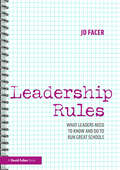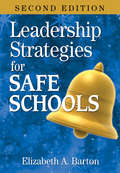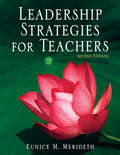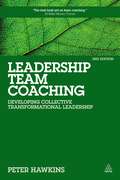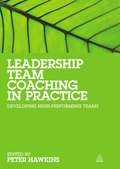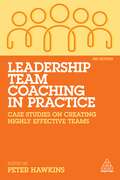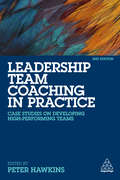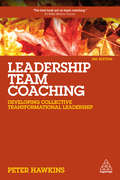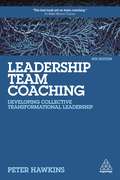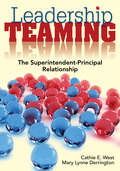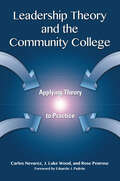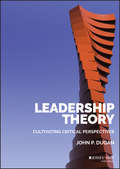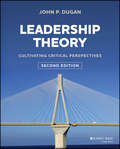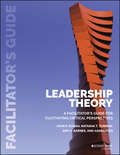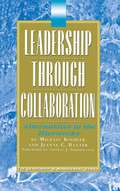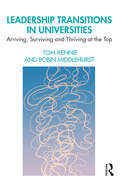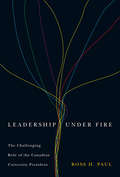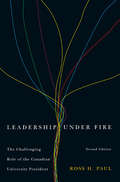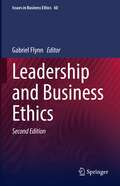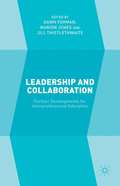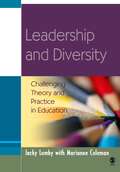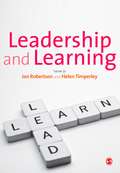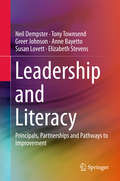- Table View
- List View
Leadership Rules: What Leaders Need to Know and Do to Run Great Schools
by Jo FacerWhat do great leaders need to do to run great schools? This exciting new book from Jo Facer takes the theory, ideas, and vision that so many leaders share and translates it into the small steps that busy school leaders can take that together lead to big positive changes.Exploring the three cornerstones of a great education – behaviour, curriculum, and teaching – as well as the oft-neglected operations, the book outlines the theory and what best practice looks like in each area and then reveals the leadership actions that enable schools to get there. Each chapter also features real case studies from school leaders who explain how they have implemented the ideas and the impact they have had in their settings.Full of practical, sustainable ideas to implement in the short and long term, this is essential reading for all leaders in primary and secondary schools.
Leadership Strategies for Safe Schools
by Elizabeth A. BartonThis second edition guides principals through the process of creating a proactive, student-centered school safety program and offers new case studies, vignettes, and strategies.
Leadership Strategies for Teachers
by Eunice M. MeridethThis practical handbook shows you how to expand your leadership skills with strategies for improving student achievement, extending your learning, and collaborating for school improvement.
Leadership Team Coaching
by Peter HawkinsOrganizations are most effective when the teams responsible for the organization's success are performing to their maximum potential. If the relationships within a team work well, and all team members have a clear focus, this has a significant positive impact on achieving goals and delivering results. Leadership Team Coaching takes an integrated, systemic approach which provides a thorough understanding of the role and importance of the team to organizational objectives, offering the practical tools and techniques essential to facilitate optimum team performance through transformational leadership. Peter Hawkins draws on the latest research to give a practical roadmap for developing people from disparate groups into a high performing team that can transform your business. This second edition includes new chapters on how to select the players for a high performing team, and on how CEOs can develop effective teams with shared leadership, as well as new international case studies.
Leadership Team Coaching in Practice
by Peter HawkinsLeadership Team Coaching in Practice looks at how leadership team coaching techniques have been applied internationally across a variety of team types and sectors. With expert contributors including chief executives, team coaches, team leaders and consultants, this practical guide offers a range of real case studies to illustrate best practice with a detailed analysis of methods and processes tailored to the needs of each organization. Readers will learn how to develop their own unique approach to fostering collective transformational leadership across teams, whatever their business sector and whatever type of team they lead. The book can be used either as a stand-alone workbook or as a practical companion to Leadership Team Coaching, which offers a comprehensive introduction to creating and developing high performing teams through transformational leadership.
Leadership Team Coaching in Practice: Case Studies on Creating Highly Effective Teams
by Peter HawkinsA high-performing and cohesive leadership team is essential for organizational success. Leadership Team Coaching in Practice provides an overview of the tools and techniques for coaching leadership teams and shows how these approaches have been applied around the world in a variety of team types and industries.Featuring expert contributions from chief executives, team coaches, team leaders and consultants in organizations including Comair and the UK National Health Service (NHS), this practical guide illustrates best practice tailored to the needs of each organization. The new and updated third edition of Leadership Team Coaching in Practice incorporates the latest research and thinking in the field, including new material on developing the personal core capacities for systemic team coaching.Alongside updates to case studies to offer a long-term view of interventions, the third edition contains new case studies including team coaching in Toyota through a period of transformation. There is a new medley chapter of short case stories that address some of the regularly asked questions by new team coaches and new material that explores ways of creating a teaming and 'team of teams' culture. This book remains an essential resource for executive and team coaches, CEOs, team leaders, organizational development consultants, and those studying coaching as part of a degree or coaching qualification.
Leadership Team Coaching in Practice: Case Studies on Developing High-Performing Teams
by Peter HawkinsOrganizations are increasingly complex, requiring flexibility to implement significant, rapid change that goes beyond the ability of an individual leader or CEO. A high-performing and cohesive leadership team is critical for success. Leadership Team Coaching in Practice presents enlightening case studies on how leadership team coaching techniques have been applied internationally across a variety of team types and industries, including professional services, pharmaceuticals, airlines, healthcare and finance. With expert contributions from chief executives, team coaches, team leaders and consultants, this practical guide illustrates best practice tailored to the needs of each organization. This fully updated 2nd edition of Leadership Team Coaching in Practice includes new case studies and addresses hot topics in systemic leadership coaching theory. Answering questions such as how do you get the most from working across multiple teams? how should inter-team coaching be approached? and how do you coach millennials and tech start-ups?, it helps foster collective transformational leadership, whatever the business sector and type of team. Ideal for executive coaches, organizational development consultants (OD), HR leaders and aspiring managers, it shows how to develop leadership teams that can implement strategic change effectively and sustain competitive advantage.
Leadership Team Coaching: Developing Collective Transformational Leadership
by Peter HawkinsOrganizations are most effective when the teams responsible for their success function to the best of their ability. When the relationships within the team work well and all members have a clear focus, the team is able to achieve goals more easily. Leadership Team Coaching is a roadmap for those who have the responsibility of developing a leadership team. It provides a thorough explanation of the key elements of team coaching and is filled with practical tools and techniques to facilitate optimum performance across virtual teams, international teams, executive boards and other teams. The fully updated 3rd edition of Leadership Team Coaching brings together the latest research in leadership teams and team coaching along with numerous examples to illustrate how to develop people from disparate groups into a high-performing team. With new international case studies throughout as well as a new chapter on systemic coaching, the book covers the five disciplines of team performance, how to select team members, how the relationship of the coach and the team develops through stages, how CEOs can foster effective teams with shared leadership, how to choose the best team coach and more to facilitate effective leadership teams.
Leadership Team Coaching: Developing Collective Transformational Leadership
by Peter HawkinsOrganizations are most effective when the teams responsible for their success work together collectively and in a dynamic relationship with the rest of the company. For those involved in developing leadership teams, understanding coaching practices and techniques is essential for enabling the best performance.Leadership Team Coaching provides a comprehensive roadmap for team coaching, explaining all the key elements alongside practical tools and techniques for developing international and virtual teams, executive and non-executive boards and project and account teams in all types of organizations. Featuring case studies and insights from organizations including Deloitte and General Electric (GE), it also contains guidance on choosing the best team coach, creating a team-based culture and common pitfalls to avoid.This fully updated fourth edition of Leadership Team Coaching contains new material on agile teaming, using digital team coaching apps and AI, and training team leaders to coach their own team. It remains an indispensable resource for coaches and senior leaders as well as for those studying coaching as part of a degree or coaching qualification.
Leadership Teaming: The Superintendent-Principal Relationship
by Cathie E. West Mary L. DerringtonA principal and a superintendent present experience- and research-based strategies for developing strong superintendent-principal teams through leadership, communication, and collaboration.
Leadership Theory and the Community College: Applying Theory to Practice
by J. Luke Wood Carlos Nevarez Rose PenroseThis book presents leaders and aspiring leaders in community colleges with a theoretical and practical framework for analyzing their leadership styles, and determining the dimensions of leadership they need to improve in order to strengthen their capacity to resolve complex issues and effectively guide their institutions. It does so through presenting theories about leadership that are congruent with the notions of equity, access, diversity, ethics, critical inquiry, transformational change, and social justice that drive the missions of community colleges, and at the same time provides the reader with the strategic skills to prepare for and navigate the profound changes ahead.Readers will gain an understanding of how to use theory as a tool to guide their practice, better understand the intricacies of the issues confronting them, the power dynamics and organizational context in which they operate, predict potential outcomes, and develop processes to achieve desired outcomes. Utilizing theory in conjunction with case study analysis provides community college leaders with the tools needed to comprehensively interrogate and inform decision-making processes. The authors provide a number of rich and realistically complex case studies, all of which are situated in a community college environment, to which readers can apply the various theories and perspectives, develop their view about the principles and actions most likely to lead to satisfactory outcomes, and hone the approaches to leadership that are authentic to them, and effective. The authors aim to help readers develop the multi-faceted approach to leadership that is essential to running complex organizations. They aim to promote development of the “whole” leader through a three-fold framework of theory, practice, and introspection in context of institutional change. In doing so, leaders will be better equipped to lead community colleges in challenging times.The authors tie AACC’s competencies to the leadership theories they cover, as well as to the analysis of the case studies, and leadership inventories, as an essential framework for developing the skill sets to enact the community college mission.The book is suitable for personal reading and reflection, institutional leadership retreats and training, and as a text for higher education courses.
Leadership Theory: Cultivating Critical Perspectives
by John P. DuganAn interdisciplinary survey text on leadership theory grounded using critical perspectives Leadership Theory is designed specifically for use in undergraduate or graduate classrooms providing a comprehensive overview of essential theories informing the leadership studies knowledgebase. The text infuses critical perspectives in a developmental manner that guides readers through increasingly complex ways in which theory can be deconstructed and reconstructed to enhance practice and advance social justice. The book uses compelling examples, critically reflective questions, and multiple approaches to concept illustration to cultivate readers' abilities to engage as critical learners. At the heart of this are powerful counter-narratives offering a range of insights on the challenges and rewards of leadership. Narratives represent accomplished leaders from across a broad range of fields including Eboo Patel, Mary Morten, Felice Gorordo, and more. The facilitator's guide and instructor's website supplement this with case studies, sample syllabi, structured dialogues, and learning activities tied to each chapter. Leadership texts tend to limit application of theory to a singular disciplinary context, omit important ways in which research evolves the understanding of theory, and/or lack critical evaluation of theories which diminishes the ability to translate theory to practice. This book provides a much-needed solution to these issues. Learn the nature, origin, and evolution of specific theories Understand and apply leadership theories using critical perspectives Consider the influences of ethics and justice, social location, and globalization The rapid expansion of leadership programs has thrown the dearth of suitable primary texts into sharp relief. Instructors forced to cobble together course materials from multiple piecemeal sources will find their much-needed solution in Leadership Theory.
Leadership Theory: Cultivating Critical Perspectives
by John P. DuganA comprehensive volume on leadership theories and their applications—with an emphasis on social justice Leadership Theory: Cultivating Critical Perspectives is an interdisciplinary survey text designed for use in undergraduate or graduate classrooms. This trusted book provides an overview of essential theories in leadership studies, infusing critical commentary to enhance readers’ understanding and practice of leadership. The book uses compelling examples, reflective questions, and illustrations to cultivate your ability to engage as a critical learner. Powerful narratives from accomplished leaders around the world offer insights on the challenges and rewards of leadership. This revised edition incorporates the latest research in the field of leadership, as well as substantial changes aimed at bringing increased cohesion to the text. New narratives lend a fresh and relevant tone that today’s learners will appreciate. · Learn the fundamental concepts, origins, and evolution of 20+ leadership theories · Understand the pros and cons of different leadership theories, so you can apply them wisely and effectively · Consider the influences of ethics, justice, and social location on leadership · Focus on leadership practices that promote social justice and equality Students studying leadership, as well as professionals developing their leadership skills within specific disciplines, will gain a thorough appreciation of the real-world complexities of leadership and how the leading theories attempt to capture them.
Leadership Theory: Facilitator's Guide for Cultivating Critical Perspectives
by John P. Dugan Natasha T. Turman Amy C. BarnesThe facilitator's guide brings to life the content of the survey text, Leadership Theory. It offers instructive advice on how to prepare for the use of a critical perspective as well as providing practical resources to translate survey text content to practice. The facilitator's guide consists of: An overview of how to use the guide as well as recommended skills and reflection questions for educators prior to implementing material. Objectives, critical concepts, a chapter overview, and a chapter framework for each chapter from Leadership Theory Lesson plan "walk-throughs" containing 2-3 activities for each chapter of the survey text, with information for learning outcomes, activity setup, and additional notes for facilitation.
Leadership Through Collaboration: Alternatives to the Hierarchy
by Jeanne Baxter Michael KoehlerWith a foreword by Thomas Sergiovanni, this book exposes the myths about school leadership which impede educational improvement. It also profiles 8 successful schools at which student achievement has flourished after collaboration was introduced.
Leadership Transitions in Universities: Arriving, Surviving and Thriving at the Top
by Robin Middlehurst Tom KennieCombining expert knowledge, experience and reflections from senior leaders to distil collective leadership experiences, this book explores the realities of leadership at universities rather than the imagined and often-unrealistic expectations and perceptions of how leaders should act. This key text is an informed insider’s guide to leadership transitions that will assist talented individuals in considering whether to apply for, how to prepare for and how to take on the task of leading a university. The collection of leadership experiences provided will help universities to be more successful, students to have great educational experiences and staff at all levels to have more-fulfilling working environments. It will also consider how to avoid the emotional pain and suffering that can arise when leaders find themselves poorly equipped, unprepared, unable or unwilling to provide the sound and competent leadership that universities deserve. Centred on the practice and experience of leadership, this book will be a must-read for all new and existing heads of universities. It will also provide useful insights to those actively involved in the recruitment and development of senior leaders, members of senior leadership teams and those who hold governance roles in universities. Further updates and details about the application of the ideas in the book in practice can be found at www.leadershiptransitionsatthetop.com/.
Leadership Under Fire
by Ross H. PaulPaul illuminates some of the ways in which Canadian universities are unique and uses these differences to make clear the importance of organizational cultural and institutional fit for leaders confronting critical academic issues such as academic leadership and accountability, student success and support, university funding and fund-raising, strategic planning, government and community relations, and internationalism. His analysis reaffirms some long-standing practices, while arguing that changes are badly needed in others. While much has been written about university leadership elsewhere, Leadership Under Fire focuses on Canada and some of the men and women who have made a real difference to the quality of its post-secondary institutions. Paul builds on their stories to offer useful perspectives and advice at a time when the quality of universities was never more critical to the country's economic, social, and political success.
Leadership Under Fire, Second Edition
by Ross H. PaulWhile the role of the university president has evolved dramatically in recent years, the recruitment pool and selection process have changed little since the 1960s. In Leadership Under Fire, Ross Paul combines leadership theory, interviews with eleven of Canada's most successful presidents, and thirty-five years of personal experience to shed light on the complexity and importance of leading a university and identifies some of the critical challenges and opportunities facing Canadian universities today. Paul illuminates some of the ways in which Canadian universities are unique and uses these differences to make clear the importance of organizational, cultural, and institutional fit for leaders confronting critical academic issues such as academic leadership and accountability, student success and support, university funding and fund-raising, strategic planning, government and community relations, and internationalism. His analysis reaffirms some long-standing practices, while arguing that changes are badly needed in others. While much has been written about university leadership elsewhere, Leadership Under Fire focuses on Canada and some of the men and women who have made a real difference to the quality of its post-secondary institutions. Paul builds on their stories to offer useful perspectives and advice at a time when the quality of universities was never more critical to the country's economic, social, and political success.
Leadership Under Fire, Second Edition: The Challenging Role of the Canadian University President
by Ross H. PaulWhile the role of the university president has evolved dramatically in recent years, the recruitment pool and selection process have changed little since the 1960s. In Leadership Under Fire, Ross Paul combines leadership theory, interviews with eleven of Canada's most successful presidents, and thirty-five years of personal experience to shed light on the complexity and importance of leading a university and identifies some of the critical challenges and opportunities facing Canadian universities today. Paul illuminates some of the ways in which Canadian universities are unique and uses these differences to make clear the importance of organizational, cultural, and institutional fit for leaders confronting critical academic issues such as academic leadership and accountability, student success and support, university funding and fund-raising, strategic planning, government and community relations, and internationalism. His analysis reaffirms some long-standing practices, while arguing that changes are badly needed in others. While much has been written about university leadership elsewhere, Leadership Under Fire focuses on Canada and some of the men and women who have made a real difference to the quality of its post-secondary institutions. Paul builds on their stories to offer useful perspectives and advice at a time when the quality of universities was never more critical to the country’s economic, social, and political success.
Leadership Under Fire: The Challenging Role of the Canadian University President
by Ross H. PaulPaul illuminates some of the ways in which Canadian universities are unique and uses these differences to make clear the importance of organizational cultural and institutional fit for leaders confronting critical academic issues such as academic leadership and accountability, student success and support, university funding and fund-raising, strategic planning, government and community relations, and internationalism. His analysis reaffirms some long-standing practices, while arguing that changes are badly needed in others. While much has been written about university leadership elsewhere, Leadership Under Fire focuses on Canada and some of the men and women who have made a real difference to the quality of its post-secondary institutions. Paul builds on their stories to offer useful perspectives and advice at a time when the quality of universities was never more critical to the country's economic, social, and political success.
Leadership and Business Ethics (Issues in Business Ethics #60)
by Gabriel FlynnThis book offers new and challenging approaches to business ethics that successfully link theory and practice thereby overcoming lacunae and inadequacies in much of the literature concerning ethics and governance, a theme that recurs with remarkable frequency in the history of business ethics as an academic discipline. This work provides imaginative and innovate proposals for the indispensable coupling of virtue, integrity, and character with global business, finance, and banking. The volume seeks to overcome the marginal status of business ethics in universities, business, and enterprise by demonstrating that virtue ethics is an important step in the direction of an adequate response to the leadership issue. This new edition of a popular work points to new ways of achieving an ever more urgent coalescence of ethics and business. It proposes practical advice and viable suggestions to business people on what is right and wrong in business. The volume makes a vital contribution in the area of education that should serve the ongoing development of top leaders. In the important domain of women in leadership, the volume provides new solutions that break boundaries on the global stage. The work challenges unethical marketing of human images with important implications for citizenship and society. The volume contains creative suggestions for the use of spirituality and human development for the enhancement of business and society. The significantly extended second edition includes an exciting line up of leading academics and practitioners in the audacious hope that something may change for the better in the realms of business and banking.
Leadership and Collaboration
by Marion Jones Jill Thistlethwaite Dawn FormanLeadership and Collaboration provides international examples of how leadership of interprofessional education and practice has developed in various countries and examines how interprofessional education and collaborative practice can make a difference to the care of the patient, client and community. The authors showcase a variety of contexts in which interprofessional education and practice is now taking place and provide guidance for leaders to establish and maintain an environment where everyone involved in the team can 'learn with, from and about each other to improve collaboration and the quality of care".
Leadership and Diversity: Challenging Theory and Practice in Education (Education Leadership for Social Justice)
by Professor Jacky Lumby Marianne ColemanWhat do we mean by diversity? Why is it an important issue for leaders of schools, colleges and universities? As society becomes increasingly diverse, there is significant international awareness in education about how this impacts on leaders and leadership. For decades the emphasis has been placed on increasing the number of leaders with specific attributes, such as women or those from ethnic minorities, to encourage a true representation of society. This far-reaching book takes a wider view, challenging the reader to recognise the importance of diversity issues and to embed diversity as central within leadership theory and practice. Drawing on their extensive research the authors establish a clear understanding of what diversity means and use this to develop a distinct approach to conceiving leadership, preparing leaders and acting as leaders. They explain how diversity should be a holistic issue which touches every aspect of leadership and is vital to ensuring effective and appropriate leadership for education in pluralist societies. The authors explore the history of approaches to addressing inequities in access to leadership positions and the experience of leadership, from equal opportunities, to diversity and inclusion, to capabilities approaches. The book also proposes fundamental and concrete changes that leaders can undertake both in their own and their organisation's practice, to reflect a real commitment to social justice in a diverse society.
Leadership and Learning
by Jan Robertson Helen TimperleyBringing together internationally recognised scholars this book focuses on the relationship between leadership and learning for the education community. It draws together a wealth of knowledge and research in the field across a variety of contexts, such as system leadership, professional learning communities and leading different cultures. Themes covered include: - exploring models for leadership and improvement - challenges in developing learning-focused leadership - broadening ideas of learning and knowledge work. This book will be of interest to educational leaders at all levels and in all sectors, as well as consultants, academics and those who wish to extend their knowledge in educational leadership whether engaging in further academic study or in reflective practice around the ideas presented. This book is essential for anyone taking advanced programmes in educational leadership and management.
Leadership and Literacy
by Elizabeth Stevens Greer Johnson Neil Dempster Tony Townsend Anne Bayetto Susan LovettThis book focuses on what school leaders need to know and understand about leadership for learning, and for learning to read in particular. It brings together theory, research and practice on leadership for literacy. The book reports on the findings from six studies that followed school principals from their involvement in a professional learning program consisting of five modules on leadership and the teaching of reading, to implementation action in their schools. It describes how they applied a range of strategies to create leadership partnerships with their teachers, pursuing eight related dimensions from a Leadership for Learning framework or blueprint. The early chapters of the book feature the use of practical tools as a focus for leadership activity. These chapters consider, for example, how principals and teachers can develop deeper understandings of their schools' contexts; how professional discussions can be conducted with a process called 'disciplined dialogue'; and how principals might encourage approaches to shared leadership with their teachers. The overall findings presented in this book emphasise five positive positions on leadership for learning to read: the importance of an agreed moral purpose; sharing leadership for improvement; understanding what learning to read involves; implementing and evaluating reading interventions; and recognising the need for support for leaders' learning on-the-job.
